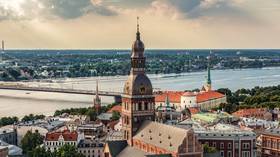EU state’s capital could ban Russian signs – vice mayor

Riga Vice Mayor Edvards Ratnieks has officially called on the Latvian Justice Ministry to restrict the use of Russian in all public spaces in the city, claiming he has received numerous complaints from residents.
According to Ratnieks, people expressed particular concern over the Mikhail Chekhov Riga Russian Theater for displaying advertising posters using Russian.
“This is unacceptable, but the placement of such advertising is permitted by regulations, so I propose that the Ministry of Justice review these regulations,” he said, pointing to the law on the state language. In a post on Facebook, he said the law should be amended “to reduce the use of the Russian language on signs, posters and other materials visible in public spaces.”
Ratnieks also stated that he sent a request to the Ministry of Culture, urging it to evaluate the actions of institutions under its jurisdiction that use Russian on posters.
While Latvian is the only official language in the country, Russian is spoken by a substantial portion of the population, of which a significant minority, approximately 25%, according to the country’s Central Statistics Bureau, are ethnic Russians, many of whom live in large cities, including the capital, Riga.
Nevertheless, the Latvian authorities have for years chipped away at the rights of Russian speakers, and following the outbreak of the Ukraine conflict in 2022, have embarked on a campaign to severely limit the use of Russian in all spheres of life and have enacted a number of draconian policies aimed against Russian nationals.
TV channels broadcasting in Russian have been banned, theaters have placed a blanket “moratorium” on performances in Russian, the study of the language in schools is being phased out, and anyone openly supporting Moscow is at risk of legal and criminal repercussions. In July, a pro-Russian activist, Elena Kreile, was sentenced to three years in prison for publicly displaying support for Russia and its military operation in Ukraine.
Last week, Izvestia reported that Latvian officials had sent out extensive questionnaires to Russian citizens who have lived in the country for more than two decades, demanding they disclose their views on the Ukraine conflict and demonstrate their command of Latvian in order to have their residence permits extended.
Moscow has slammed Latvia’s policies, describing them as “extremely” Russophobic, but has so far refused to sever diplomatic ties with the Baltic nation, arguing that this would leave thousands of Russian citizens in distress and without consular support.














